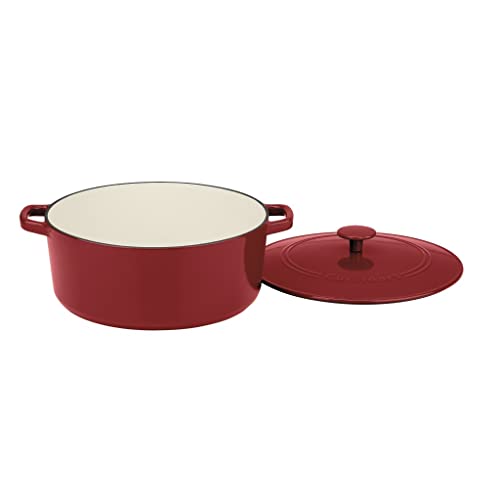Benefits of a Cast Iron Dutch Oven
Having a cast iron dutch oven is not mandatory; it’s just a piece of cookware that brings ease into your life. It can make your pursuit of flavor-packed recipes quite easy and fun-filled. Since it’s a versatile product, you can use it to roast, bake, fry, simmer, boil, broil, sauté, and whatnot! So, be it a roasted chicken or stew, you can cook anything in this one-pot conveniently. Plus, it works perfectly fine with every heat source. You can place it on the stovetop or in the oven without worrying. It’s also possible to switch the heat sources in the middle of cooking. Since this dutch oven uses cast iron, you can expect longevity and efficient heating performance. Cast iron is brilliant at heat retention and circulation. It allows the heat to engage with the food in a multi-directional manner, cooking it evenly. Moreover, a dutch oven is much more compact than a traditional oven. It results in energy conservation and lower maintenance prices. You won't have to spend thousands on monthly bills.
Types of Cast Iron Dutch Ovens
Although the cast iron dutch oven itself is a type, you will come across even further material-based classifications: traditional and enameled. Knowing about the pros and cons of these types can make purchasing a simple process. Here is an overview of each for your help.
Traditional cast iron
Most people refer to these as bare cast iron dutch ovens. Since bare cast iron is an excellent heat conductor, these ovens can tolerate high temperatures without chipping. So even after months of use, you will find no signs of degradation at all. This is exactly why it’s a preference among culinary experts and professionals. However, their downside includes intensive care. You must wash them manually and season them to preserve the iron's integrity.
Enameled cast iron
As the name suggests, enameled cast iron dutch ovens have a cast iron core and an enamel coating. This particular addition to the cast iron prevents rusting and corrosion. It also makes cleaning simple and eliminates the need for seasoning. However, enamel does not have a high heat tolerance. Dutch ovens with thin enamel coats can become chipped and damaged easily. So the enameled dutch ovens are only ideal for those who wish to perform light-to-moderate cooking tasks.
How to Purchase the Perfect Cast Iron Dutch Oven
If you haven’t done your homework, it’s possible that confusion will cloud your mind when it’s time to choose. And the variety will leave you feeling dumbfounded, under pressure, and with a doubtful mindset. Nobody wants that and that’s why our team has compiled these key factors that you must consider when buying a cast iron dutch oven.
Aesthetics
Indeed, the fundamental purpose of a dutch oven is to cook. But, if you intend to use this versatile cookware frequently, don’t you want it to match with your kitchen’s theme and the rest of your cookware's aesthetics? Therefore, we strongly recommend looking into the dutch oven’s style, shape, and color; there are plenty of options available on the market!
Build quality
Typically, a cast iron dutch oven is sturdy and damage-resistant. However, as mentioned, enameled types may be prone to chipping if the coating is too thin. So, when choosing enameled cast iron dutch ovens, opt for the heavy-duty ones. If durability is the product’s shady feature, there are multiple ways to investigate it. Look into the manufacturer-provided details and customer feedback. Also, choose products that come with some warranty or guarantee for security.
Capacity
There’s no point in having a dutch oven that doesn’t let you prepare the desired quantity of food. So make sure you always consider the size and capacity; you’ll usually find them in the product’s description, which is measured in quarts. On average, a dutch oven with 6–8 quarts will suffice for the needs of most large families. However, if you’re a small family (approximately 4 people), opt for a dutch oven with a 3-5 quart capacity. Individuals will do well with even smaller versions.
Performance
Both traditional and enameled cast iron dutch ovens have visible differences in performance. The traditional ones are nonstick and tolerant to high temperatures, while the latter is the opposite. Ideally, you should make sure that the dutch oven heats the food evenly, quickly, and efficiently. There should be no burning or sticking.
Usability
It's important to examine the ergonomic features of the oven. Is it wide and deep enough to accommodate food without spillage? Does it have curved handles for easy handling and transportation? You may also want to evaluate the cleaning process and precautions. It’s best if your selected oven is dishwasher-safe. If it’s not, make sure that it at least has a smooth surface that allows thorough cleaning.
Cost of a Cast Iron Dutch Oven
Generally, a cast iron dutch oven is lower-priced and more budget-friendly than a traditional oven. It also conserves energy and helps you save money in the long run. However, the amount you spend will vary depending on two fundamental factors.
Requirements
Your needs shape the ideal product type and features. For example, if you want a heavy-duty, seasoned cast iron dutch oven of 8 quarts, you will have to spend more.
Brand
Brand preference has a significant influence on the price. If you prefer a premium brand endorsed by popular culinary professionals, prepare to pay a hefty amount. Comparatively, a product with similar features but sold by a struggling brand may cost much less. For example, a high-quality cast iron dutch oven with a good capacity (6-7 quarts) will cost you around $100–$130.







